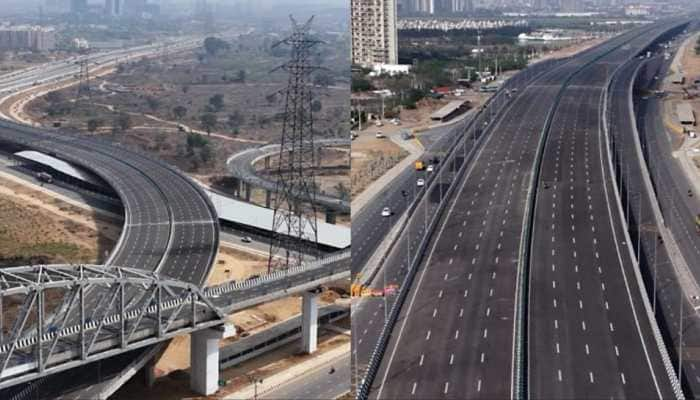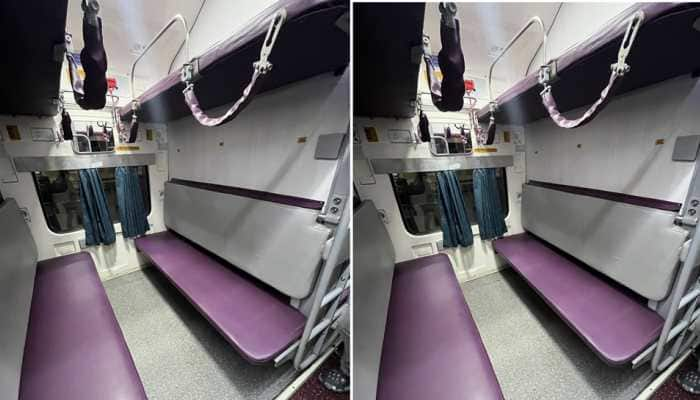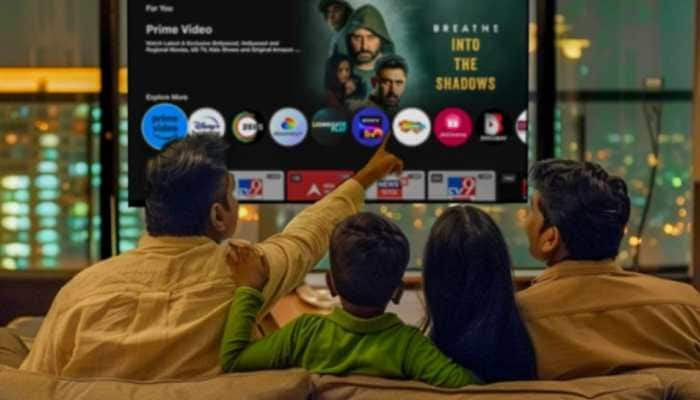US agrees to review Indian diplomat Devyani Khobragade`s detention procedure
As India upped the ante against the US, seeking an "unconditional apology" over the arrest and humiliating strip-search of its ranking diplomat in New York, the United States of America agreed to review Devyani Khobragade`s detention procedure.
Trending Photos
)
 Zee Media Bureau
Washington: As India upped the ante against the US, seeking an "unconditional apology" over the arrest and humiliating strip-search of its ranking diplomat in New York, the United States of America on Tuesday agreed to review Devyani Khobragade`s detention procedure.
The US further said that it would look into internal procedures to make out if correct steps were followed.
Sticking to its guns, the US said it acted "appropriately". It further demanded restoration of security for its missions in India.
Even as it spoke of a "broad and deep friendship" and an "important relationship" with India, US officials on Tuesday expressed no regret, leave aside an "unconditional apology" demanded by India over the arrest and alleged strip search of Khobragade.
Reacting to a slew of retaliatory measures taken by India in response to the treatment of Khobragade, India`s deputy consul general in New York, the State Department spokesperson Marie Harf said "an isolated episode" should not "impact the bilateral relationship."
"We understand that this is a sensitive issue for many in India," Harf said.
"Accordingly, we are looking into the intake procedures surrounding this arrest to ensure that all appropriate procedures were followed and every opportunity for courtesy was extended."
So far there is nothing to indicate that "anything but appropriate measures were followed" Harf said. "But again, we don`t want this to negatively impact our bilateral relationship, and we`ll keep talking about it with them on the ground and here," she said.
"The US and India enjoy a broad and deep friendship, and this isolated episode is not in any way indicative of the close and respectful ties that we share and will continue to share," Harf said.
US officials, she said "have conveyed at high levels to the Government of India our expectations that India will continue to fulfil all of its obligations under the Vienna Convention on Diplomatic Relations, and Vienna Convention on Consular Relations."
"Obviously, the safety and security of our diplomats and consular officers in the field is a top priority."
The US, she said, will "continue to work with India to ensure that all of our diplomats and consular officers are being afforded full rights and protections."
"Also, of course, safety and security of our facilities as well is something we take very seriously, and we`ll keep working with the Indians on that."
Adding a new dimension to the case, Harf also claimed that the State Department had advised the Indian embassy "in writing in September of allegations of abuse made by an Indian national against the deputy consul general of India in New York."
"Obviously, we play a role in this, but the Department of Justice also obviously handles the legal aspect of it as well," she said.
However, Harf said she was "not aware" if the Indian embassy had informed the State Department about a pending court case in India against Khobragade`s former India-based domestic assistant, Sangeeta Richard, who has been absconding since June this year.
US Secretary of State John Kerry, who is currently in the Philippines was "aware of what`s going on" and the State Department has had "conversations" with the White House about the issue.
Asked if Khobragade was strip-searched, Harf said the State Department was looking into what transpired. While the US State diplomatic security had followed "standard procedures" she could not speak for the US marshals, who took the diplomat into custody.
But in response to specific news media queries about whether a strip search had been conducted on the Indian diplomat, the US Marshals Service confirmed that "standard arrestee intake procedures" were followed.
"Yes, Devyani Khobragade was subject to the same search procedures as other USMS arrestees held within the general prisoner population in the Southern District of New York." It said she had been placed in an "available and appropriate cell," it said in a statement.
The US` reaction came after India took a slew of steps to pare down the privileges of American diplomats in New Delhi in a retaliatory measure.
Describing the treatment of Khobragade, who was put through both strip and cavity search procedures, as "barbaric and despicable", India sent a formal communication asking US consulates to surrender the Diplomatic Identity Cards issued to their personnel.
They would be treated as equivalent to Indian diplomats in US consulates, in effect, being deprived of numerous diplomatic privileges they enjoy in India.
There are two international conventions that govern diplomatic relations between countries, one the Vienna Convention on Diplomatic Relations and the other the Vienna Convention on Consular Relations.
India has withdrawn all airport access passes for consular officials and import clearances for the embassy. This helped them to import liquor without paying customs fees.
The airport pass helped US diplomats and their families to enter the airport without security checks. They would now be required to request passes each time they take a flight, said officials. Indian consulate staff in the US are not given airport passes.
Parliamentary Affairs Minister Kamal Nath, asserting that India was not a "Banana republic", said the US should tender an "unconditional apology" to India over the public humiliation of its diplomat and that "more steps need to be taken to awaken the US (because) it`s (now) a changed world".
Sending a clear message of its anger, Congress vice president Rahul Gandhi and union Home Minister Sushilkumar Shinde Tuesday declined to meet a US Congressional delegation. BJP`s prime ministerial candidate Narendra Modi too declined to meet the US team.
On Monday, Lok Sabha Speaker Meira Kumar and National Security Advisor Shivshankar Menon had cancelled their meetings with the four-member US delegation of Democrat and Republican lawmakers. The NSA described the treatment meted out to her as "despicable" and "barbaric".
Khobragade, India`s deputy consul general in New York, was charged last week with visa fraud and making false statements for seeking residence and employing her Indian housemaid.
The 39-year-old diplomat was strip-searched, confined in a cell with drug addicts and also subjected to DNA swabbing, sources confirmed to a news agency.
External Affairs Minister Salman Khurshid said India has expressed "deep distress and sense of disquiet" over the incident.
Khobragade`s father on Tuesday met Shinde and requested that UPA chairperson Sonia Gandhi to intervene in the matter.
In further tough action, the Ministry of External Affairs on Tuesday directed Delhi Police to remove the many security barricades outside the US embassy even though a police picket still remained.
The barricades had for years restricted public movement around the embassy and normal vehicular traffic was particularly barred from the slip road in front of the embassy and the visa office at the back of the chancery.
India is also seeking details of the salaries paid to Indian staff employed in the US consulates, including those working as domestic helps with the families of American officials. The government has also asked for salary details of teachers at US schools here to see if they are paying tax.
Khobragade was charged with paying lower salary - in comparison to US standards - to the Indian help she had taken along.
She was accused by Manhattan`s Indian American US Attorney Preet Bharara of visa fraud and exploiting her babysitter and housekeeper. She was handcuffed in public by law enforcement authorities in New York last Thursday while she was dropping her daughter at school.
Khobragade was covered under the Vienna Convention for consular staff, which did not carry the same privileges as for embassy diplomats.
US State Department spokesperson Marie Harf made a distinction between "diplomatic immunity" and "consular immunity" and suggested police followed "standard procedures."
(With IANS inputs)
Zee Media Bureau
Washington: As India upped the ante against the US, seeking an "unconditional apology" over the arrest and humiliating strip-search of its ranking diplomat in New York, the United States of America on Tuesday agreed to review Devyani Khobragade`s detention procedure.
The US further said that it would look into internal procedures to make out if correct steps were followed.
Sticking to its guns, the US said it acted "appropriately". It further demanded restoration of security for its missions in India.
Even as it spoke of a "broad and deep friendship" and an "important relationship" with India, US officials on Tuesday expressed no regret, leave aside an "unconditional apology" demanded by India over the arrest and alleged strip search of Khobragade.
Reacting to a slew of retaliatory measures taken by India in response to the treatment of Khobragade, India`s deputy consul general in New York, the State Department spokesperson Marie Harf said "an isolated episode" should not "impact the bilateral relationship."
"We understand that this is a sensitive issue for many in India," Harf said.
"Accordingly, we are looking into the intake procedures surrounding this arrest to ensure that all appropriate procedures were followed and every opportunity for courtesy was extended."
So far there is nothing to indicate that "anything but appropriate measures were followed" Harf said. "But again, we don`t want this to negatively impact our bilateral relationship, and we`ll keep talking about it with them on the ground and here," she said.
"The US and India enjoy a broad and deep friendship, and this isolated episode is not in any way indicative of the close and respectful ties that we share and will continue to share," Harf said.
US officials, she said "have conveyed at high levels to the Government of India our expectations that India will continue to fulfil all of its obligations under the Vienna Convention on Diplomatic Relations, and Vienna Convention on Consular Relations."
"Obviously, the safety and security of our diplomats and consular officers in the field is a top priority."
The US, she said, will "continue to work with India to ensure that all of our diplomats and consular officers are being afforded full rights and protections."
"Also, of course, safety and security of our facilities as well is something we take very seriously, and we`ll keep working with the Indians on that."
Adding a new dimension to the case, Harf also claimed that the State Department had advised the Indian embassy "in writing in September of allegations of abuse made by an Indian national against the deputy consul general of India in New York."
"Obviously, we play a role in this, but the Department of Justice also obviously handles the legal aspect of it as well," she said.
However, Harf said she was "not aware" if the Indian embassy had informed the State Department about a pending court case in India against Khobragade`s former India-based domestic assistant, Sangeeta Richard, who has been absconding since June this year.
US Secretary of State John Kerry, who is currently in the Philippines was "aware of what`s going on" and the State Department has had "conversations" with the White House about the issue.
Asked if Khobragade was strip-searched, Harf said the State Department was looking into what transpired. While the US State diplomatic security had followed "standard procedures" she could not speak for the US marshals, who took the diplomat into custody.
But in response to specific news media queries about whether a strip search had been conducted on the Indian diplomat, the US Marshals Service confirmed that "standard arrestee intake procedures" were followed.
"Yes, Devyani Khobragade was subject to the same search procedures as other USMS arrestees held within the general prisoner population in the Southern District of New York." It said she had been placed in an "available and appropriate cell," it said in a statement.
The US` reaction came after India took a slew of steps to pare down the privileges of American diplomats in New Delhi in a retaliatory measure.
Describing the treatment of Khobragade, who was put through both strip and cavity search procedures, as "barbaric and despicable", India sent a formal communication asking US consulates to surrender the Diplomatic Identity Cards issued to their personnel.
They would be treated as equivalent to Indian diplomats in US consulates, in effect, being deprived of numerous diplomatic privileges they enjoy in India.
There are two international conventions that govern diplomatic relations between countries, one the Vienna Convention on Diplomatic Relations and the other the Vienna Convention on Consular Relations.
India has withdrawn all airport access passes for consular officials and import clearances for the embassy. This helped them to import liquor without paying customs fees.
The airport pass helped US diplomats and their families to enter the airport without security checks. They would now be required to request passes each time they take a flight, said officials. Indian consulate staff in the US are not given airport passes.
Parliamentary Affairs Minister Kamal Nath, asserting that India was not a "Banana republic", said the US should tender an "unconditional apology" to India over the public humiliation of its diplomat and that "more steps need to be taken to awaken the US (because) it`s (now) a changed world".
Sending a clear message of its anger, Congress vice president Rahul Gandhi and union Home Minister Sushilkumar Shinde Tuesday declined to meet a US Congressional delegation. BJP`s prime ministerial candidate Narendra Modi too declined to meet the US team.
On Monday, Lok Sabha Speaker Meira Kumar and National Security Advisor Shivshankar Menon had cancelled their meetings with the four-member US delegation of Democrat and Republican lawmakers. The NSA described the treatment meted out to her as "despicable" and "barbaric".
Khobragade, India`s deputy consul general in New York, was charged last week with visa fraud and making false statements for seeking residence and employing her Indian housemaid.
The 39-year-old diplomat was strip-searched, confined in a cell with drug addicts and also subjected to DNA swabbing, sources confirmed to a news agency.
External Affairs Minister Salman Khurshid said India has expressed "deep distress and sense of disquiet" over the incident.
Khobragade`s father on Tuesday met Shinde and requested that UPA chairperson Sonia Gandhi to intervene in the matter.
In further tough action, the Ministry of External Affairs on Tuesday directed Delhi Police to remove the many security barricades outside the US embassy even though a police picket still remained.
The barricades had for years restricted public movement around the embassy and normal vehicular traffic was particularly barred from the slip road in front of the embassy and the visa office at the back of the chancery.
India is also seeking details of the salaries paid to Indian staff employed in the US consulates, including those working as domestic helps with the families of American officials. The government has also asked for salary details of teachers at US schools here to see if they are paying tax.
Khobragade was charged with paying lower salary - in comparison to US standards - to the Indian help she had taken along.
She was accused by Manhattan`s Indian American US Attorney Preet Bharara of visa fraud and exploiting her babysitter and housekeeper. She was handcuffed in public by law enforcement authorities in New York last Thursday while she was dropping her daughter at school.
Khobragade was covered under the Vienna Convention for consular staff, which did not carry the same privileges as for embassy diplomats.
US State Department spokesperson Marie Harf made a distinction between "diplomatic immunity" and "consular immunity" and suggested police followed "standard procedures."
(With IANS inputs)Stay informed on all the latest news, real-time breaking news updates, and follow all the important headlines in india news and world News on Zee News.
Advertisement
Live Tv
Advertisement







)
)
)
)
)
)
)
)
)
)
